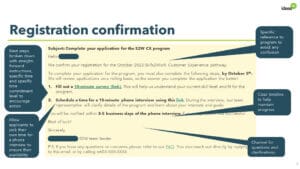Better Equipping Southeast Asian Workers to Compete in the Modern Market
HIGHLIGHTS
- While there are many formal education and training programs in Southeast Asia focused on digital technology, the curricula are often not customized for the changing job market.
- Skills2Work—a digital learning and career upskilling program in the Philippines and Malaysia—offers online training, industry skills certification, and job placement support to people seeking careers in high-demand digital industries.
- We used behavioral science to identify opportunities to enhance take up, engagement, and persistence of Skills2Work’s pilot program, and made design recommendations for their next program in Malaysia.
The Challenge
As the job market in many Southeast Asian countries increasingly emphasizes digital technology, job seekers need to adapt and adopt new skills. While there are many formal technical and vocational education and training programs in the region, the curricula are often not customized for the changing job market.
Skills2Work, an upskilling training program created by The Asia Foundation, aims to help recent graduates and experienced professionals—especially women, people with disabilities, youth, and other marginalized groups—gain the skills and certification required to start or transition to industries that are in-demand in the digital economy. However, during the program’s pilot in the Philippines, completion rates and continued attendance after the first online class was lower than expected.
Upskilling training programs aim to equip job seekers with the skills necessary to move up the employment ladder or make a career transition. However, these trainings can be difficult for participants to navigate and complete, especially for those who have other important responsibilities in their daily lives. It is important to design skill training programs with a streamlined user experience for participants to encourage them to persist through and complete the training.
Our Approach
In partnership with The Asia Foundation, we conducted a behavioral audit to diagnose the potential behavioral barriers that led program participants to drop out of the program early. By reviewing the program’s materials and structure, we identified several hassles throughout the participant’s registration and program journey. For example, potential registrants may have a misperception of who the program is for and may not see themselves as a good fit. Once in the program, participants may struggle to meet the requirements to succeed through the program, such as attending each lesson and completing assignments on time.
Results
To address these barriers and improve participant persistence through the program, we proposed the following solutions:
- More clearly communicating to participants over email about the timeline and information about registration and onboarding steps.
- A re-design of the “participant welcome kit” and onboarding materials.
- A shareable scorecard to provide continuous feedback to participants and build motivation.
- Activities to boost self-confidence and make it the norm for participants to seek help throughout the program.
Skills2Work incorporated some of the design suggestions for the Malaysia cohort of participants, including the updated email communication.
- Behaviorally redesigned registration confirmation email
- Behaviorally redesigned acceptance email
Takeaway
Interested in learning more about this work applying behavioral science to a crucial social problem? Email livelihoods@ideas42.org or reach out to us on X at @ideas42 to join the conversation.











